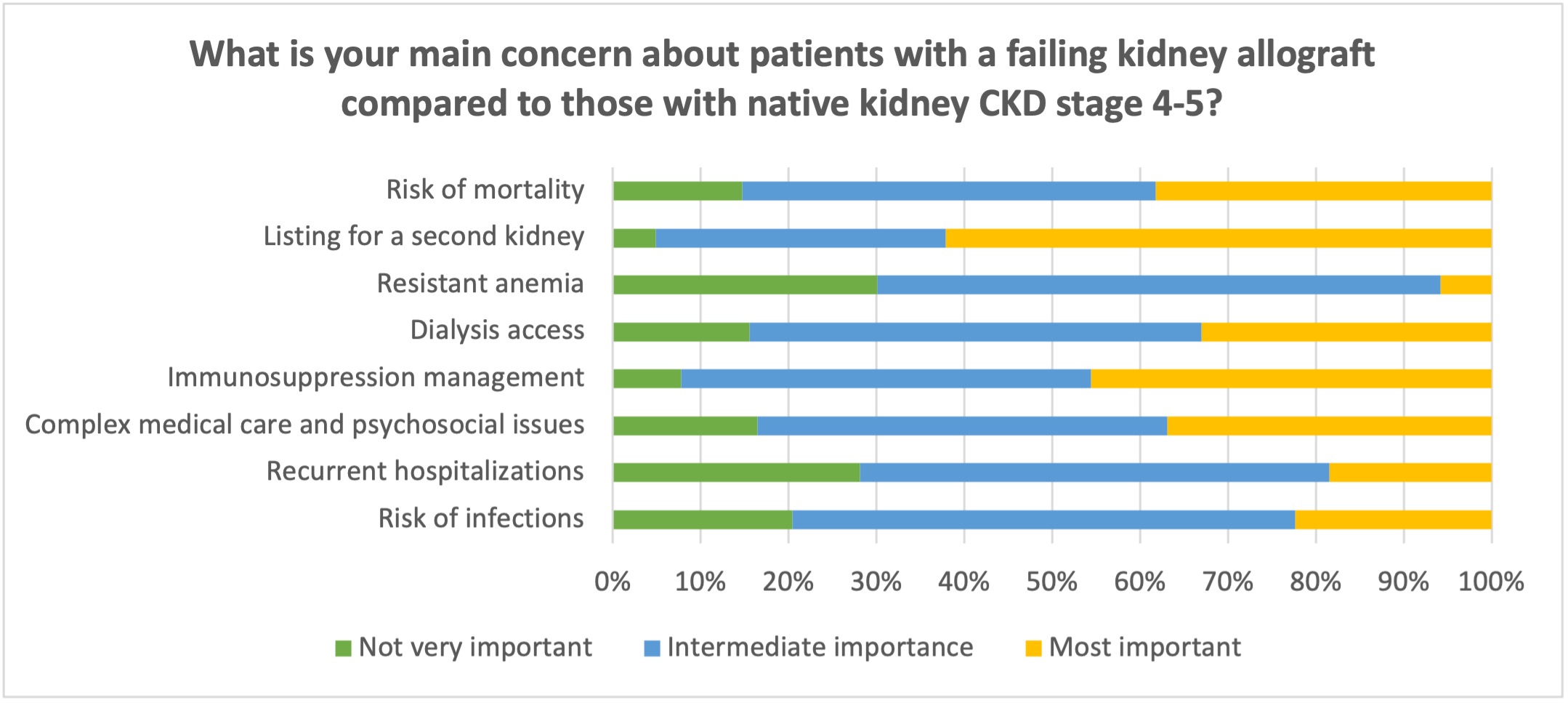The Perspective of General Nephrologists Toward Transitions of Care and Management of Patients with Failing Kidney Allografts
T. Alhamad1, H. Murad1, D. Dadhania2, M. Pavlakis3, S. Parajuli4, B. P. Concepcion5, N. Singh6, N. Murakami7, M. Casey8, M. Ji1, M. Lubetzky9, E. Tantisattamo10, O. Alomar1, A. Faravardeh11, C. Blosser12, A. Basu13, M. Molnar14, G. Gupta15, J. T. Adler16, D. Adey17, K. J. Woodside18, R. Parsons13, K. Lentine19
1Wash U in St. Louis, Saint Louis, MO, 2Weill Cornell Med, New York, NY, 3Beth Israel, Boston, MA, 4U of Wisconsin, Madison, WI, 5Vanderbilt U, Nashville, TN, 6Northwell Health, Great neck, NY, 7Brigham and Women, Boston, MA, 8MUSC, Charleston, SC, 9Weill Cornell Medicine, New York, NY, 10UCI, Orange, CA, 11SHARP, San Diego, CA, 12U of Washington, Seattle, WA, 13Emory U, Atlanta, GA, 14U of Utah, Salt Lake City, UT, 15VCU, Richmond, VA, 16Surgery, Brigham and Women, Boston, MA, 17UCSF, San Francisco, CA, 18U of Michigan, Ann Arbor, MI, 19Saint Louis U, Saint Louis, MO
Meeting: 2022 American Transplant Congress
Abstract number: 1366
Keywords: Graft failure, Immunosuppression, Kidney transplantation
Topic: Clinical Science » Kidney » 33 - Kidney Psychosocial
Session Information
Session Time: 7:00pm-8:00pm
 Presentation Time: 7:00pm-8:00pm
Presentation Time: 7:00pm-8:00pm
Location: Hynes Halls C & D
*Purpose: Failing kidney allograft with subsequent return to dialysis is associated with high risk of morbidity and mortality. This project aimed to examine general nephrologist perspectives in managing patients with failing kidney allografts.
*Methods: The KPCOP Failing Allograft Workgroup designed and distributed a survey via mail (with electronic participation scan code) to the members of the American Society of Nephrology and through electronic links by individual email invitations to general nephrologists in an academic and private setting between May and Sept 2021.
*Results: There were 103 respondents with primarily adult nephrology practices. 41% of respondents had an academic affiliation. More than 60% reported listing for a second kidney as the most important concern in caring for these patients, followed by immunosuppression management (46%), and risk of mortality (38%), while resistant anemia was considered less of a concern. For the initial approach to immunosuppression reduction, 60% would stop antimetabolites first, and 26% would defer to transplant nephrologist. For communicating with transplant centers about immunosuppression cessation, 60% reported always, 29% sometimes, and 12% reported making the decision independently. Nephrologists with academic appointments communicate with transplant providers more than private nephrologists (74% vs 49%, P=0.015). The majority (77%) of respondents were more likely to refer a patient with a failing allograft, compared to native CKD, for another transplant.
*Conclusions: General nephrologists have heterogeneous approaches to the care of patients with a failing allograft and prioritize re-listing. Efforts to strengthen transitions of care and clinical practice guidelines are needed to improve the outcomes of this vulnerable population.
To cite this abstract in AMA style:
Alhamad T, Murad H, Dadhania D, Pavlakis M, Parajuli S, Concepcion BP, Singh N, Murakami N, Casey M, Ji M, Lubetzky M, Tantisattamo E, Alomar O, Faravardeh A, Blosser C, Basu A, Molnar M, Gupta G, Adler JT, Adey D, Woodside KJ, Parsons R, Lentine K. The Perspective of General Nephrologists Toward Transitions of Care and Management of Patients with Failing Kidney Allografts [abstract]. Am J Transplant. 2022; 22 (suppl 3). https://atcmeetingabstracts.com/abstract/the-perspective-of-general-nephrologists-toward-transitions-of-care-and-management-of-patients-with-failing-kidney-allografts/. Accessed March 1, 2026.« Back to 2022 American Transplant Congress

